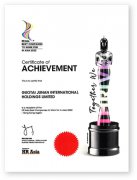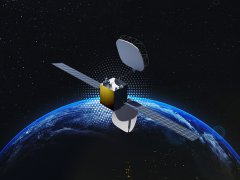Visa marks Earth Day 2021 with industry-leading milestones, innovative partnerships and initiatives toward its vision of a sustainable future
SAN FRANCISCO--(BUSINESS WIRE)--Visa (NYSE: V), a leading global payments technology company, announced today a new global commitment to reach net-zero emissions by 2040, and that the company achieved carbon neutrality across its operations in 2020.i Visa also outlined plans to become a climate positive company through new partnerships and expanded initiatives to support sustainable commerce and the transition to a low-carbon economy beyond the company’s own footprint.
“Visa is committed to creating a more sustainable future,” said Al Kelly, chairman and chief executive officer of Visa. “Our new net-zero commitment and enhanced efforts across our network in support of sustainable initiatives are immediate ways we will achieve our goals to help build a better future for our planet.”
Net-zero by 2040 – 10 years ahead of Paris Climate Agreement goal
As part of the commitment to reach net-zero emissions by 2040, Visa announced it is a new signatory of The Climate Pledge, an initiative co-founded by Amazon and Global Optimism, as well as a new member of the Climate Business Network, a World Wildlife Fund (WWF) initiative to accelerate action toward a net-zero future. Visa’s net-zero commitment is aligned with emerging global standards and definitions and will include efforts with suppliers to abate a significant portion of the greenhouse gas footprint of the company’s purchased goods and services. Visa also has committed to set science-based targets through the Science Based Target initiative at the 1.5 degree Celsius ambition level. These new commitments join Visa’s existing sustainability leadership, including its transition to 100 percent renewable electricity usage in 2020.
“This Earth Month Visa is using the power of our network to accelerate transformation in sustainability and economic recovery, while helping ensure that the planet and economies around the world thrive,” said Douglas Sabo, chief sustainability officer of Visa. “By prioritizing clean energy and sustainable practices, investing in environmentally innovative initiatives and engaging with corporate and civil society leaders on climate, we are committed to being a part of the global solution to climate change.”
Supporting Sustainable Commerce
Visa is expanding its initiatives to use its products, services, network, data, payments expertise and brand to support sustainable commerce and the transition to a low-carbon economy. Today, Visa announced its collaboration with the Cambridge Institute for Sustainability Leadership (CISL) to work together to identify new opportunities to apply electronic payments capabilities and the Visa network toward realizing a sustainable future. Results of the collaboration are anticipated in Summer 2021.
Visa’s collaboration with CISL complements the company’s efforts to work across its network to support a low-carbon future, including:
- Partnerships advancing sustainable payment cards and accounts
- Global initiatives supporting sustainable behaviors, such as in mobility and travel
- Developing sustainable insights to support stakeholders in commerce in understanding consumer barriers and drivers of sustainable living behaviors
- Using the brand’s platforms to inspire sustainable living among millions of consumers
Visa’s new goals and efforts to support sustainable commerce build upon the company’s existing recognized industry leadership in sustainability, including inclusion on the following: Dow Jones Sustainability North American Index, America’s Most Responsible Companies, 100 Best Corporate Citizens and 100 Most Just Companies.
For more information, please visit: https://usa.visa.com/visa-everywhere/blog/bdp/2021/04/15/sustainable-commerce-and-1618453815474.html.
About Visa Inc.
Visa is the world’s leader in digital payments. Our mission is to connect the world through the most innovative, reliable and secure payment network – enabling individuals, businesses and economies to thrive. Our advanced global processing network, VisaNet, provides secure and reliable payments around the world, and is capable of handling more than 65,000 transaction messages a second. The company’s relentless focus on innovation is a catalyst for the rapid growth of connected commerce on any device. As the world moves from analogue to digital, Visa is applying our brand, products, people, network and scale to reshape the future of commerce. For more information visit usa.visa.com/about-visa.html, usa.visa.com/visa-everywhere/blog.html and @VisaNews.
This release contains forward-looking statements within the meaning of the U.S. Private Securities Litigation Reform Act of 1995. Forward-looking statements generally are identified by words such as “will,” “plans,” “is expected,” and other similar expressions. Examples of forward-looking statements include, but are not limited to, statements we make regarding the timing and likelihood of taking actions related to our strategy, plans for future climate initiatives and goals, and the potential impact of our actions. By their nature, forward-looking statements: (i) speak only as of the date they are made; (ii) are not statements of historical fact or guarantees of future performance; and (iii) are subject to risks, uncertainties, assumptions or changes in circumstances that are difficult to predict or quantify. Therefore, actual results could differ materially and adversely from Visa’s forward-looking statements due to a variety of factors, including those contained in our Annual Report on Form 10-K for the fiscal year ended September 30, 2020, and our other filings with the U.S. Securities and Exchange Commission. You should not place undue reliance on such statements. Except as required by law, we do not intend to update or revise any forward-looking statements as a result of new information, future developments or otherwise.
i This carbon neutrality achievement covers greenhouse gas emissions footprint from Visa’s Scope 1 (owned source), Scope 2 (purchased electricity) and business travel and employee commuting elements of Scope 3 (value chain) emissions. Scopes 1, 2 and 3 are as defined by the Greenhouse Gas Protocol of the World Resources Institute (WRI) and the World Business Council for Sustainable Development (WBCSD).







